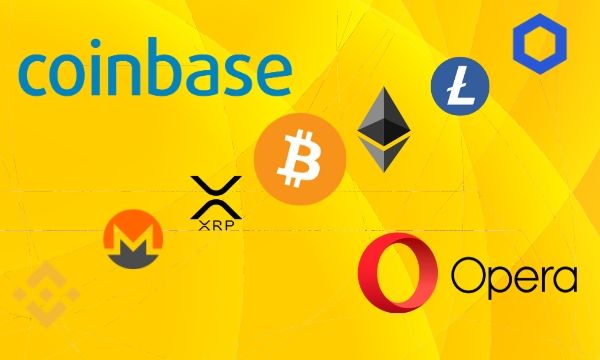Satoshi Protocol: First CDP on Bitcoin Layer2, 500k OSHI Airdrop with Binance wallet and BEVM
[PRESS RELEASE – Singapore, Singapore, April 10th, 2024]
On April 4th, Binance Web3 Wallet joined forces with BEVM, a leading Bitcoin Layer2, and its ecosystem project, Satoshi Protocol, to launch an airdrop campaign worth millions.
Users who bridge BTC to the BEVM via Binance Web3 Wallet and borrow at least $10 SAT (USD-stablecoin) will be eligible to share a pool of 500k OSHI and 10.5 million BEVM tokens. The campaign has attracted over 30,000 participants in just 3 days since its launch.
Satoshi Protocol is the first CDP protocol built on BEVM, live on BEVM mainnet on March 28th. In addition to the Binance campaign, there’s a referral program that allows early participants to accumulate points by borrowing the SAT and inviting friends.
What Makes BEVM Unique?
BEVM is an EVM-compatible Bitcoin Layer 2 solution that stands out in the crowded market. By leveraging Taproot consensus, Schnorr signatures, MAST, and Bitcoin SPV, BEVM achieves the highest level of decentralization and security among all BTC Layer 2 solutions.
Key features of BEVM:
- Native BTC Layer 2: BEVM utilizes BTC as the network gas and stores transaction data on the BTC mainnet, ensuring compatibility with the original Bitcoin protocol.
- EVM compatibility: Developers can seamlessly migrate their Ethereum-based dApps to BEVM, expanding the reach of these applications to the Bitcoin ecosystem.
- Decentralized and secure: BEVM employs Musig2 multi-signature aggregation and Bitcoin light nodes to achieve a trustless and secure environment.
Satoshi Protocol: Unleashing Bitcoin’s Liquidity
Satoshi Protocol is the first Collateralized Debt Position (CDP) protocol built on BEVM, aiming at providing liquidity for BTC through the SAT dollar stablecoin, expanding the scenarios of BTCFi. This move unlocks trillion-dollar liquidity within the Bitcoin ecosystem, offering users a way to maintain Bitcoin holdings while gaining liquidity.
The Bitcoin ecosystem is experiencing a renaissance. Recent advancements like inscriptions and scaling solutions have revitalized the ecosystem. Satoshi Protocol’s team views the upcoming halving and the launch of the Runes protocol as poised to attract a wave of new users.
However, a critical challenge persists the lack of a reliable, fiat-pegged crypto for seamless trading and efficient market pricing. This is where Satoshi Protocol steps in. By enabling users to borrow SAT with their Bitcoin as collateral, Satoshi Protocol offers a reliable liquidity solution within the Bitcoin ecosystem.
Satoshi Protocol Milestones
In the past month, Satoshi Protocol has built a strong community, with 60,000+ followers on Twitter and 70,000+ members across Telegram and Discord.
Let’s see what they have achieved :
- February 24th: Satoshi Protocol launched on BEVM testnet.
- March 18th: Testnet concluded with 100,000+ participants and 80,000+ NFT minted.
- March 24th: Smart contracts passed security audits by Scalebit and Supremacy.
- March 26th: Pre-seed funding secured from Web3Port Foundation, Waterdrip Capital and BEVM Foundation.
- March 28th: Launched on BEVM Mainnet.
- April 4th: 500k OSHI Airdrop with BEVM on Binance wallet.
How does Satoshi Protocol work?
The Satoshi Protocol utilizes a sophisticated system to maintain a stable peg of $1 for SAT. This system combines several mechanisms: over-collateralization, permissionless liquidation, stability pools, and arbitrage. Additionally, it features OSHI, a utility token granting holders 97.5% of the protocol’s revenue.
For more details about OSHI and sOSHI, refer to the official documentation: OSHI & sOSHI.
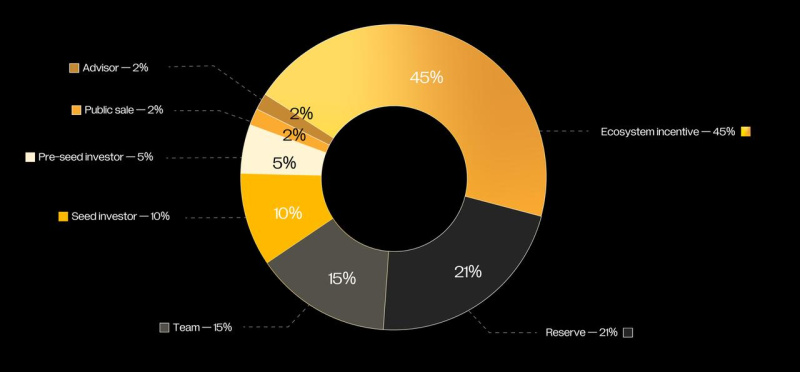
OSHI distribution
The interplay between SAT and OSHI forms the heart of Satoshi Protocol. Here’s the complete picture:
Collateralized Borrowing
When borrowing SAT, users must maintain a minimum collateral ratio (MCR) of 110%. This means the borrowed amount cannot exceed 90.9% of the deposited BTC value.
Liquidation
A liquidation is triggered if a user’s collateral value dips below 110% (MCR) due to price fluctuations. The user’s BTC collateral is sold at a discount to Stability Pool providers to repay the SAT loan. This mechanism protects the protocol and prevents borrowers from taking on excessive debt.
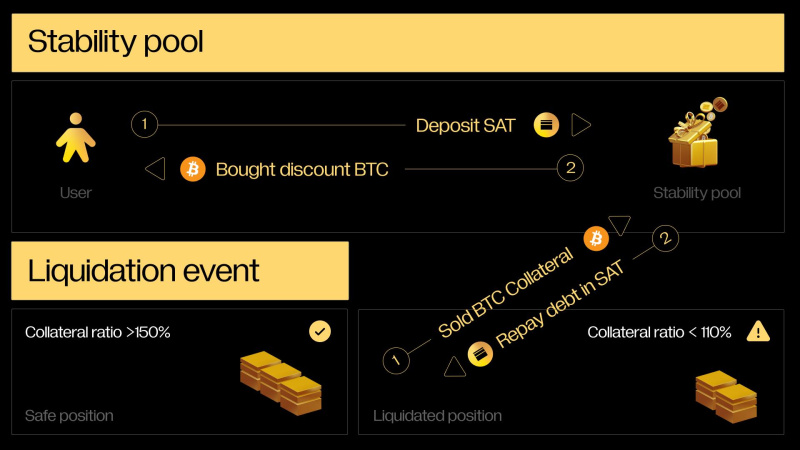
Maintaining the Peg
A robust three-pronged system ensures SAT’s value remains consistently pegged to the US dollar:
Redemption: Arbitrage activity helps regulate SAT’s price and keep it within the desired range. If SAT dips below $1, arbitrageurs can buy discounted SAT and redeem them for $1 worth of BTC from the protocol. Conversely, if SAT exceeds $1.1, users can borrow SAT at the MCR (110%), sell them at a premium on decentralized exchanges (DEXs), and pocket the profit.
Over-collateralization: As mentioned earlier, over-collateralization (MCR of 110%) acts as a safety net. The protocol discourages borrowers from defaulting by requiring a higher collateral value and protects itself from price fluctuations.
Stability Pool: This pool serves as a final safety measure. If a user’s collateral ratio falls below the MCR, the Stability Pool provides the necessary liquidity to execute a liquidation event and maintain protocol stability.
Satoshi Protocol x BEVM Airdrop with Binance wallet
BEVM and Satoshi Protocol recently joined forces with Binance Web3 Wallet to offer a total of 10.5M $BEVM and 500k $OSHI Token Airdrop.
By using Binance Wallet to complete tasks like bridge to BEVM, and create positions on Satoshi Protocol, you’ll be eligible to share the rewards.
Duration: 2024/04/04-2024/05/04
Rewards: 10,500,000 BEVM and 500,000 OHSI
Tasks:
- Using Binance Wallet
- Bridge BTC to the BEVM ( 0.0004 BTC, ~$25)
- Create positions on Satoshi Protocol ( at least 10 SAT )
Join Binance Wallet Airdrop Campaign
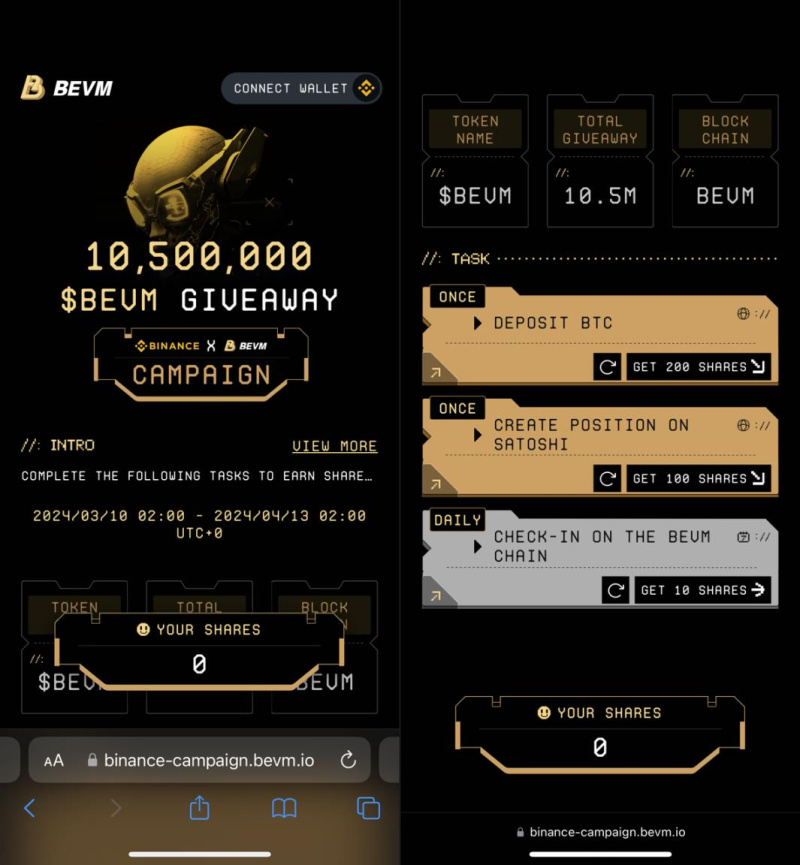
How to Participate in this Campaign
STEP 1: Users should go to Campaign Landing Page, and connect Binance Wallet
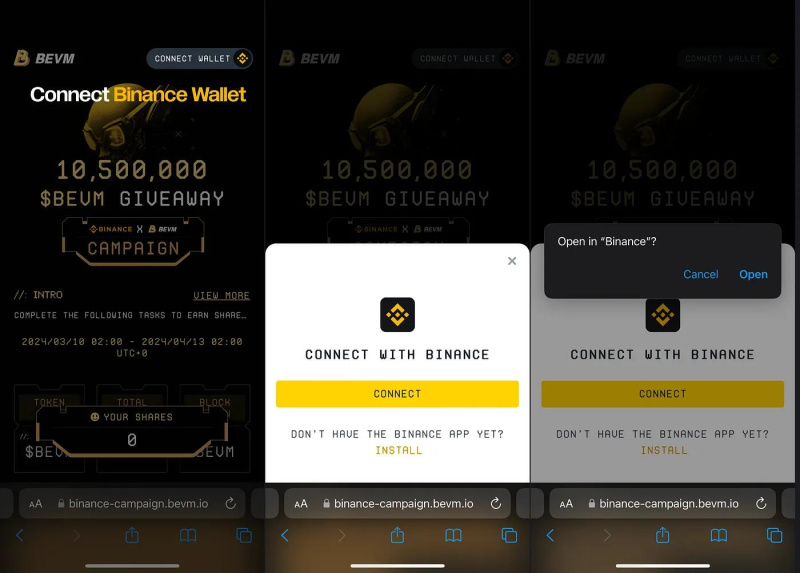
STEP 2: Withdraw BTC and bridge to BEVM
- Suggest withdrawing at least 0.0004 BTC to complete the task
- Using OmniBTC to transfer BTC from BSC to BEVM
- Using BEVM bridge to transfer BTC from mainnet to BEVM ( ~ 30mins )
STEP 3: Users should go to Satoshi Protocol, and create Position
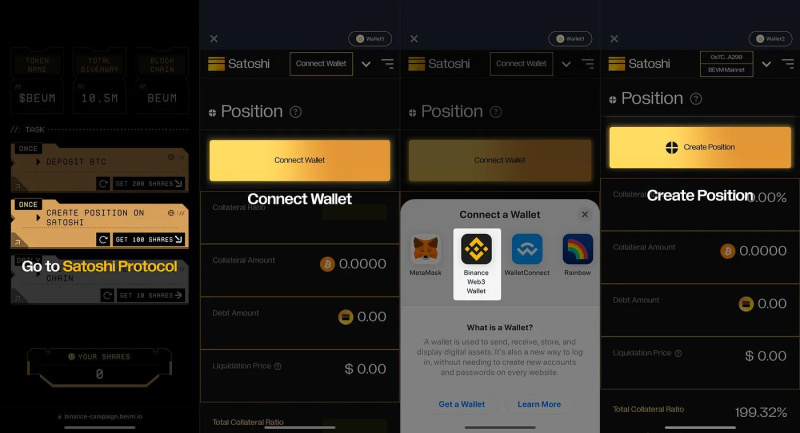
Users should go to Satoshi Protocol, and Connect Wallet
- Input BTC Amount
- Borrow SAT ( at least 10 SAT )
- (Optional) Fill in your referrer, get 150+ points
- Click “Approve”
- Click “Create Position”
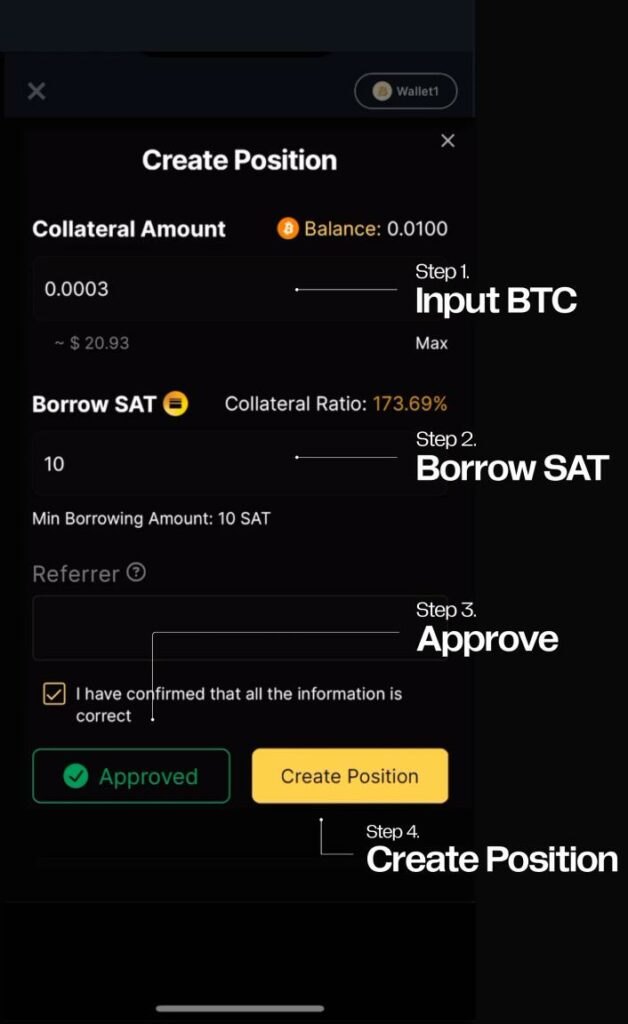
Binance Wallet Mobile tutorial: Create Position Using Binance Web3 Wallet
Upon completing all those steps, the user becomes qualified for the BEVM and OSHI airdrop!
Bridging the Future: Satoshi Protocol and Binance Wallet’s Airdrop Campaign
Satoshi Protocol represents a glimpse into the future of Bitcoin finance. By leveraging the BEVM and a robust CDP model, it allows users to borrow BTC-backed stablecoin SAT and expand the possibility for Bitcoin Ecosystem.
Binance Wallet launched an airdrop campaign with a total of 10.5M $BEVM, 500K $OSHI for those who bridge BTC to BEVM and create positions on Satoshi Protocol, which is also Binance Wallet’s first integration with a Bitcoin Layer 2 solution. BTCFi is heading west.
About Satoshi Protocol
Built on BEVM, it’s the first CDP protocol to unlock the true potential of Bitcoin. Unleash unprecedented liquidity through SAT, a stablecoin designed to supercharge the booming BTCFi market.
To learn about Satoshi Protocol, users can follow:
Website | Web APP | Twitter | Telegram | Discord | Docs | Blog
The post Satoshi Protocol: First CDP on Bitcoin Layer2, 500k OSHI Airdrop with Binance wallet and BEVM appeared first on CryptoPotato.




